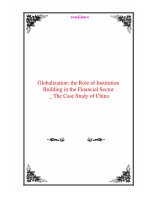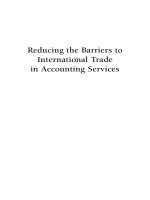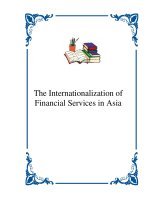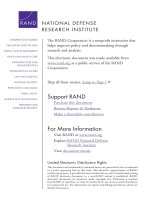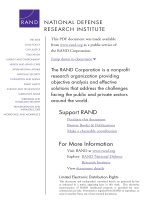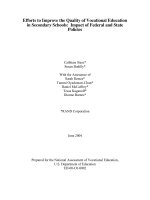The Silver Lining Moral Deliberations in Films
Bạn đang xem bản rút gọn của tài liệu. Xem và tải ngay bản đầy đủ của tài liệu tại đây (762.59 KB, 189 trang )
The Silver Lining
Moral Deliberations in
Modern Cinema
5
th
EDITION
Sam Vaknin, Ph.D.
Editing and Design:
Lidija Rangelovska
Lidija Rangelovska
A Narcissus Publications Imprint, Skopje 2014
Not for Sale! Non-commercial edition.
© 2002-14 Copyright Lidija Rangelovska.
All rights reserved. This book, or any part thereof, may not be used or reproduced in
any manner without written permission from:
Lidija Rangelovska – write to:
Philosophical Musings and Essays
Malignant Self-love: Narcissism Revisited
Created by: LIDIJA RANGELOVSKA
REPUBLIC OF MACEDONIA
C O N T E N T S
I. The Talented Mr. Ripley
II. The Truman Show
III. The Matrix
IV. Shattered
V. Titanic
VI. Being John Malkovich
VII. Dreamcatcher: The Myth of Destructibility
VIII. I, Robot: The Fourth Law of Robotics
IX. Surrogates: The Interrupted Self
X. Avatar: The Ecology of Environmentalism
XI. The Invention of Lying: Fact and Truth
XII. Hostel: The American Hostel
XIII. Inceptions and Its Errors
XIV. Aliens ‘R Us: The Ten Errors of Science Fiction
XV. Loving Gaze, Adulating Gaze (“The Beaver”)
XVI. The Malignant Optimism of the Abused (“We Need to Talk
about Kevin”)
XVII. The Disruptive Engine: Innovation (“The Artist”)
XVIII. What to Expect When You Are Expecting
XIX. Her and Interspecies Romance
XX. The Author
XXI. About "After the Rain"
The Talented Mr. Ripley
"The Talented Mr. Ripley" is an Hitchcockian and blood-
curdling study of the psychopath and his victims. At the
centre of this masterpiece, set in the exquisitely decadent
scapes of Italy, is a titanic encounter between Ripley, the
aforementioned psychopath protagonist and young
Greenleaf, a consummate narcissist.
Ripley is a cartoonishly poor young adult whose
overriding desire is to belong to a higher - or at least,
richer - social class. While he waits upon the subjects of
his not so hidden desires, he receives an offer he cannot
refuse: to travel to Italy to retrieve the spoiled and
hedonistic son of a shipbuilding magnate, Greenleaf
Senior. He embarks upon a study of Junior's biography,
personality, likes and hobbies. In a chillingly detailed
process, he actually assumes Greenleaf's identity.
Disembarking from a luxurious Cunard liner in his
destination, Italy, he "confesses" to a gullible textile-
heiress that he is the young Greenleaf, travelling
incognito.
Thus, we are subtly introduced to the two over-riding
themes of the antisocial personality disorder (still labelled
by many professional authorities "psychopathy" and
"sociopathy"): an overwhelming dysphoria and an even
more overweening drive to assuage this angst by
belonging. The psychopath is an unhappy person. He is
besieged by recurrent depression bouts, hypochondria and
an overpowering sense of alienation and drift. He is bored
with his own life and is permeated by a seething and
explosive envy of the lucky, the mighty, the clever, the
have it alls, the know it alls, the handsome, the happy - in
short: his opposites. He feels discriminated against and
dealt a poor hand in the great poker game called life. He is
driven obsessively to right these perceived wrongs and
feels entirely justified in adopting whatever means he
deems necessary in pursuing this goal.
Ripley's reality test is maintained throughout the film. In
other words - while he gradually merges with the object of
his admiring emulation, the young Greenleaf - Ripley can
always tell the difference. After he kills Greenleaf in self-
defense, he assumes his name, wears his clothes, cashes
his checks and makes phone calls from his rooms. But he
also murders - or tries to murder - those who suspect the
truth. These acts of lethal self-preservation prove
conclusively that he knows who he is and that he fully
realizes that his acts are parlously illegal.
Young Greenleaf is young, captivatingly energetic,
infinitely charming, breathtakingly handsome and
deceivingly emotional. He lacks real talents - he know
how to play only six jazz tunes, can't make up his musical
mind between his faithful sax and a newly alluring drum
kit and, an aspiring writer, can't even spell. These
shortcomings and discrepancies are tucked under a
glittering facade of nonchalance, refreshing spontaneity,
an experimental spirit, unrepressed sexuality and
unrestrained adventurism. But Greenleaf Jr. is a garden
variety narcissist. He cheats on his lovely and loving
girlfriend, Marge. He refuses to lend money - of which he
seems to have an unlimited supply, courtesy his ever more
disenchanted father - to a girl he impregnated. She
commits suicide and he blames the primitiveness of the
emergency services, sulks and kicks his precious record
player. In the midst of this infantile temper tantrum the
rudiments of a conscience are visible. He evidently feels
guilty. At least for a while.
Greenleaf Jr. falls in and out of love and friendship in a
predictable pendulous rhythm. He idealizes his beaus and
then devalues them. He finds them to be the quiddity of
fascination one moment - and the distilled essence of
boredom the next. And he is not shy about expressing his
distaste and disenchantment. He is savagely cruel as he
calls Ripley a leach who has taken over his life and his
possessions (having previously invited him to do so in no
uncertain terms). He says that he is relieved to see him go
and he cancels off-handedly elaborate plans they made
together. Greenleaf Jr. maintains a poor record of keeping
promises and a rich record of violence, as we discover
towards the end of this suspenseful, taut yarn.
Ripley himself lacks an identity. He is a binary automaton
driven by a set of two instructions - become someone and
overcome resistance. He feels like a nobody and his
overriding ambition is to be somebody, even if he has to
fake it, or steal it. His only talents, he openly admits, are
to fake both personalities and papers. He is a predator and
he hunts for congruence, cohesion and meaning. He is in
constant search of a family. Greenleaf Jr., he declares
festively, is the older brother he never had. Together with
the long suffering fiancee in waiting, Marge, they are a
family. Hasn't Greenleaf Sr. actually adopted him?
This identity disturbance, which is at the psychodynamic
root of both pathological narcissism and rapacious
psychopathy, is all-pervasive. Both Ripley and Greenleaf
Jr. are not sure who they are. Ripley wants to be Greenleaf
Jr. - not because of the latter's admirable personality, but
because of his money. Greenleaf Jr. cultivates a False Self
of a jazz giant in the making and the author of the Great
American Novel but he is neither and he bitterly knows it.
Even their sexual identity is not fully formed. Ripley is at
once homoerotic, autoerotic and heteroerotic. He has a
succession of homosexual lovers (though apparently only
platonic ones). Yet, he is attracted to women. He falls
desperately in love with Greenleaf's False Self and it is the
revelation of the latter's dilapidated True Self that leads to
the atavistically bloody scene in the boat.
But Ripley is a different -and more ominous - beast
altogether. He rambles on about the metaphorical dark
chamber of his secrets, the key to which he wishes to
share with a "loved" one. But this act of sharing (which
never materializes) is intended merely to alleviate the
constant pressure of the hot pursuit he is subjected to by
the police and others. He disposes with equal equanimity
of both loved ones and the occasional prying
acquaintance. At least twice he utters words of love as he
actually strangles his newfound inamorato and tries to
slash an old and rekindled flame. He hesitates not a split
second when confronted with an offer to betray Greenleaf
Sr., his nominal employer and benefactor, and abscond
with his money. He falsifies signatures with ease, makes
eye contact convincingly, flashes the most heart rending
smile when embarrassed or endangered. He is a caricature
of the American dream: ambitious, driven, winsome, well
versed in the mantras of the bourgeoisie. But beneath this
thin veneer of hard learned, self-conscious and uneasy
civility - lurks a beast of prey best characterized by the
DSM IV (Diagnostic and Statistics Manual):
"Failure to conform to social norms with respect to lawful
behaviour, deceitfulness as indicated by repeated lying,
use of aliases, or conning others to personal profit or
pleasure, impulsivity or failure to plan ahead reckless
disregard for safety of self or others (and above all) lack
of remorse." (From the criteria of the Antisocial
Personality Disorder).
But perhaps the most intriguing portraits are those of the
victims. Marge insists, in the face of the most callous and
abusive behaviour, that there is something "tender" in
Greenleaf Jr. When she confronts the beguiling monster,
Ripley, she encounters the fate of all victims of
psychopaths: disbelief, pity and ridicule. The truth is too
horrible to contemplate, let alone comprehend.
Psychopaths are inhuman in the most profound sense of
this compounded word. Their emotions and conscience
have been amputated and replaced by phantom imitations.
But it is rare to pierce their meticulously crafted facade.
They more often than not go on to great success and social
acceptance while their detractors are relegated to the
fringes of society. Both Meredith and Peter, who had the
misfortune of falling in deep, unrequited love with Ripley,
are punished. One by losing his life, the other by losing
Ripley time and again, mysteriously, capriciously, cruelly.
Thus, ultimately, the film is an intricate study of the
pernicious ways of psychopathology. Mental disorder is a
venom not confined to its source. It spreads and affects its
environment in a myriad surreptitiously subtle forms. It is
a hydra, growing one hundred heads where one was
severed. Its victims writhe and as abuse is piled upon
trauma - they turn to stone, the mute witnesses of horror,
the stalactites and stalagmites of pain untold and
unrecountable. For their tormentors are often as talented
as Mr. Ripley is and they are as helpless and as clueless as
his victims are.
Return
The Truman Show
"The Truman Show" is a profoundly disturbing movie. On
the surface, it deals with the worn out issue of the
intermingling of life and the media.
Examples for such incestuous relationships abound:
Ronald Reagan, the cinematic president was also a
presidential movie star. In another movie ("The
Philadelphia Experiment") a defrosted Rip Van Winkle
exclaims upon seeing Reagan on television (40 years after
his forced hibernation started): "I know this guy, he used
to play Cowboys in the movies".
Candid cameras monitor the lives of webmasters (website
owners) almost 24 hours a day. The resulting images are
continuously posted on the Web and are available to
anyone with a computer.
The last decade witnessed a spate of films, all concerned
with the confusion between life and the imitations of life,
the media. The ingenious "Capitan Fracasse", "Capricorn
One", "Sliver", "Wag the Dog" and many lesser films
have all tried to tackle this (un)fortunate state of things
and its moral and practical implications.
The blurring line between life and its representation in the
arts is arguably the main theme of "The Truman Show".
The hero, Truman, lives in an artificial world, constructed
especially for him. He was born and raised there. He
knows no other place. The people around him –
unbeknownst to him – are all actors. His life is monitored
by 5000 cameras and broadcast live to the world, 24 hours
a day, every day. He is spontaneous and funny because he
is unaware of the monstrosity of which he is the main
cogwheel.
But Peter Weir, the movie's director, takes this issue one
step further by perpetrating a massive act of immorality
on screen. Truman is lied to, cheated, deprived of his
ability to make choices, controlled and manipulated by
sinister, half-mad Shylocks. As I said, he is unwittingly
the only spontaneous, non-scripted, "actor" in the on-
going soaper of his own life. All the other figures in his
life, including his parents, are actors. Hundreds of
millions of viewers and voyeurs plug in to take a peep, to
intrude upon what Truman innocently and honestly
believes to be his privacy. They are shown responding to
various dramatic or anti-climactic events in Truman's life.
That we are the moral equivalent of these viewers-
voyeurs, accomplices to the same crimes, comes as a
shocking realization to us. We are (live) viewers and they
are (celluloid) viewers. We both enjoy Truman's
inadvertent, non-consenting, exhibitionism. We know the
truth about Truman and so do they. Of course, we are in a
privileged moral position because we know it is a movie
and they know it is a piece of raw life that they are
watching.
But moviegoers throughout Hollywood's history have
willingly and insatiably participated in numerous "Truman
Shows". The lives (real or concocted) of the studio stars
were brutally exploited and incorporated in their films.
Jean Harlow, Barbara Stanwyck, James Cagney all were
forced to spill their guts in cathartic acts of on camera
repentance and not so symbolic humiliation. "Truman
Shows" is the more common phenomenon in the movie
industry.
Then there is the question of the director of the movie as
God and of God as the director of a movie. The members
of his team – technical and non-technical alike – obey
Christoff, the director, almost blindly. They suspend their
better moral judgement and succumb to his whims and to
the brutal and vulgar aspects of his pervasive dishonesty
and sadism. The torturer loves his victims. They define
him and infuse his life with meaning. Caught in a
narrative, the movie says, people act immorally.
(IN)famous psychological experiments support this
assertion. Students were led to administer what they
thought were "deadly" electric shocks to their colleagues
or to treat them bestially in simulated prisons. They
obeyed orders. So did all the hideous genocidal criminals
in history. The Director Weir asks: should God be allowed
to be immoral or should he be bound by morality and
ethics? Should his decisions and actions be constrained by
an over-riding code of right and wrong? Should we obey
his commandments blindly or should we exercise
judgement?
If we do exercise judgement are we then being immoral
because God (and the Director Christoff) know more
(about the world, about us, the viewers and about
Truman), know better, are omnipotent? Is the exercise of
judgement the usurpation of divine powers and attributes?
Isn't this act of rebelliousness bound to lead us down the
path of apocalypse?
It all boils down to the question of free choice and free
will versus the benevolent determinism imposed by an
omniscient and omnipotent being. What is better: to have
the choice and be damned (almost inevitably, as in the
biblical narrative of the Garden of Eden) – or to succumb
to the superior wisdom of a supreme being? A choice
always involves a dilemma. It is the conflict between two
equivalent states, two weighty decisions whose outcomes
are equally desirable and two identically-preferable
courses of action. Where there is no such equivalence –
there is no choice, merely the pre-ordained (given full
knowledge) exercise of a preference or inclination. Bees
do not choose to make honey. A fan of football does not
choose to watch a football game. He is motivated by a
clear inequity between the choices that he faces. He can
read a book or go to the game. His decision is clear and
pre-determined by his predilection and by the inevitable
and invariable implementation of the principle of
pleasure. There is no choice here. It is all rather automatic.
But compare this to the choice some victims had to make
between two of their children in the face of Nazi brutality.
Which child to sentence to death – which one to sentence
to life? Now, this is a real choice. It involves conflicting
emotions of equal strength. One must not confuse
decisions, opportunities and choice.
Decisions are the mere selection of courses of action. This
selection can be the result of a choice or the result of a
tendency (conscious, unconscious, or biological-genetic).
Opportunities are current states of the world, which allow
for a decision to be made and to affect the future state of
the world. Choices are our conscious experience of moral
or other dilemmas.
Christoff finds it strange that Truman – having discovered
the truth – insists upon his right to make choices, i.e.,
upon his right to experience dilemmas. To the Director,
dilemmas are painful, unnecessary, destructive, or at best
disruptive. His utopian world – the one he constructed for
Truman – is choice-free and dilemma-free. Truman is
programmed not in the sense that his spontaneity is
extinguished. Truman is wrong when, in one of the
scenes, he keeps shouting: "Be careful, I am
spontaneous". The Director and fat-cat capitalistic
producers want him to be spontaneous, they want him to
make decisions. But they do not want him to make
choices. So they influence his preferences and
predilections by providing him with an absolutely
totalitarian, micro-controlled, repetitive environment.
Such an environment reduces the set of possible decisions
so that there is only one favourable or acceptable decision
(outcome) at any junction. Truman does decide whether to
walk down a certain path or not. But when he does decide
to walk – only one path is available to him. His world is
constrained and limited – not his actions.
Actually, Truman's only choice in the movie leads to an
arguably immoral decision. He abandons ship. He walks
out on the whole project. He destroys an investment of
billions of dollars, people's lives and careers. He turns his
back on some of the actors who seem to really be
emotionally attached to him. He ignores the good and
pleasure that the show has brought to the lives of millions
of people (the viewers). He selfishly and vengefully goes
away. He knows all this. By the time he makes his
decision, he is fully informed. He knows that some people
may commit suicide, go bankrupt, endure major
depressive episodes, do drugs. But this massive landscape
of resulting devastation does not deter him. He prefers his
narrow, personal, interest. He walks.
But Truman did not ask or choose to be put in his
position. He found himself responsible for all these people
without being consulted. There was no consent or act of
choice involved. How can anyone be responsible for the
well-being and lives of other people – if he did not
CHOOSE to be so responsible? Moreover, Truman had
the perfect moral right to think that these people wronged
him. Are we morally responsible and accountable for the
well-being and lives of those who wrong us? True
Christians are, for instance.
Moreover, most of us, most of the time, find ourselves in
situations which we did not help mould by our decisions.
We are unwillingly cast into the world. We do not provide
prior consent to being born. This fundamental decision is
made for us, forced upon us. This pattern persists
throughout our childhood and adolescence: decisions are
made elsewhere by others and influence our lives
profoundly.
As adults we are the objects – often the victims – of the
decisions of corrupt politicians, mad scientists,
megalomaniac media barons, gung-ho generals and
demented artists. This world is not of our making and our
ability to shape and influence it is very limited and rather
illusory. We live in our own "Truman Show". Does this
mean that we are not morally responsible for others?
We are morally responsible even if we did not choose the
circumstances and the parameters and characteristics of
the universe that we inhabit. The Swedish Count
Wallenberg imperilled his life (and lost it) smuggling
hunted Jews out of Nazi occupied Europe. He did not
choose, or helped to shape Nazi Europe. It was the
brainchild of the deranged Director Hitler. Having found
himself an unwilling participant in Hitler's horror show,
Wallenberg did not turn his back and opted out. He
remained within the bloody and horrific set and did his
best. Truman should have done the same. Jesus said that
he should have loved his enemies. He should have felt and
acted with responsibility towards his fellow human
beings, even towards those who wronged him greatly.
But this may be an inhuman demand. Such forgiveness
and magnanimity are the reserve of God. And the fact that
Truman's tormentors did not see themselves as such and
believed that they were acting in his best interests and that
they were catering to his every need – does not absolve
them from their crimes. Truman should have maintained a
fine balance between his responsibility to the show, its
creators and its viewers and his natural drive to get back at
his tormentors. The source of the dilemma (which led to
his act of choosing) is that the two groups overlap.
Truman found himself in the impossible position of being
the sole guarantor of the well-being and lives of his
tormentors. To put the question in sharper relief: are we
morally obliged to save the life and livelihood of someone
who greatly wronged us? Or is vengeance justified in such
a case?
A very problematic figure in this respect is that of
Truman's best and childhood friend. They grew up
together, shared secrets, emotions and adventures. Yet he
lies to Truman constantly and under the Director's
instructions. Everything he says is part of a script. It is this
disinformation that convinces us that he is not Truman's
true friend. A real friend is expected, above all, to provide
us with full and true information and, thereby, to enhance
our ability to choose. Truman's true love in the Show tried
to do it. She paid the price: she was ousted from the show.
But she tried to provide Truman with a choice. It is not
sufficient to say the right things and make the right
moves. Inner drive and motivation are required and the
willingness to take risks (such as the risk of providing
Truman with full information about his condition). All the
actors who played Truman's parents, loving wife, friends
and colleagues, miserably failed on this score.
It is in this mimicry that the philosophical key to the
whole movie rests. A Utopia cannot be faked. Captain
Nemo's utopian underwater city was a real Utopia because
everyone knew everything about it. People were given a
choice (though an irreversible and irrevocable one). They
chose to become lifetime members of the reclusive
Captain's colony and to abide by its (overly rational) rules.
The Utopia came closest to extinction when a group of
stray survivors of a maritime accident were imprisoned in
it against their expressed will. In the absence of choice, no
utopia can exist. In the absence of full, timely and
accurate information, no choice can exist. Actually, the
availability of choice is so crucial that even when it is
prevented by nature itself – and not by the designs of
more or less sinister or monomaniac people – there can be
no Utopia. In H.G. Wells' book "The Time Machine", the
hero wanders off to the third millennium only to come
across a peaceful Utopia. Its members are immortal, don't
have to work, or think in order to survive. Sophisticated
machines take care of all their needs. No one forbids them
to make choices. There simply is no need to make them.
So the Utopia is fake and indeed ends badly.
Finally, the "Truman Show" encapsulates the most
virulent attack on capitalism in a long time. Greedy,
thoughtless money machines in the form of billionaire
tycoon-producers exploit Truman's life shamelessly and
remorselessly in the ugliest display of human vices
possible. The Director indulges in his control-mania. The
producers indulge in their monetary obsession. The
viewers (on both sides of the silver screen) indulge in
voyeurism. The actors vie and compete in the compulsive
activity of furthering their petty careers. It is a repulsive
canvas of a disintegrating world. Perhaps Christoff is right
after al when he warns Truman about the true nature of
the world. But Truman chooses. He chooses the exit door
leading to the outer darkness over the false sunlight in the
Utopia that he leaves behind.
Return
The Matrix
It is easy to confuse the concepts of "virtual reality" and a
"computerized model of reality (simulation)". The former
is a self-contained Universe, replete with its "laws of
physics" and "logic". It can bear resemblance to the real
world or not. It can be consistent or not. It can interact
with the real world or not. In short, it is an arbitrary
environment. In contrast, a model of reality must have a
direct and strong relationship to the world. It must obey
the rules of physics and of logic. The absence of such a
relationship renders it meaningless. A flight simulator is
not much good in a world without aeroplanes or if it
ignores the laws of nature. A technical analysis program is
useless without a stock exchange or if its mathematically
erroneous.
Yet, the two concepts are often confused because they are
both mediated by and reside on computers. The computer
is a self-contained (though not closed) Universe. It
incorporates the hardware, the data and the instructions
for the manipulation of the data (software). It is, therefore,
by definition, a virtual reality. It is versatile and can
correlate its reality with the world outside. But it can also
refrain from doing so. This is the ominous "what if" in
artificial intelligence (AI). What if a computer were to
refuse to correlate its internal (virtual) reality with the
reality of its makers? What if it were to impose its own
reality on us and make it the privileged one?
In the visually tantalizing movie, "The Matrix", a breed of
AI computers takes over the world. It harvests human
embryos in laboratories called "fields". It then feeds them
through grim looking tubes and keeps them immersed in
gelatinous liquid in cocoons. This new "machine species"
derives its energy needs from the electricity produced by
the billions of human bodies thus preserved. A
sophisticated, all-pervasive, computer program called
"The Matrix" generates a "world" inhabited by the
consciousness of the unfortunate human batteries.
Ensconced in their shells, they see themselves walking,
talking, working and making love. This is a tangible and
olfactory phantasm masterfully created by the Matrix. Its
computing power is mind boggling. It generates the
minutest details and reams of data in a spectacularly
successful effort to maintain the illusion.
A group of human miscreants succeeds to learn the secret
of the Matrix. They form an underground and live aboard
a ship, loosely communicating with a halcyon city called
"Zion", the last bastion of resistance. In one of the scenes,
Cypher, one of the rebels defects. Over a glass of
(illusory) rubicund wine and (spectral) juicy steak, he
poses the main dilemma of the movie. Is it better to live
happily in a perfectly detailed delusion - or to survive
unhappily but free of its hold?
The Matrix controls the minds of all the humans in the
world. It is a bridge between them, they inter-connected
through it. It makes them share the same sights, smells
and textures. They remember. They compete. They make
decisions.
The Matrix is sufficiently complex to allow for this
apparent lack of determinism and ubiquity of free will.
The root question is: is there any difference between
making decisions and feeling certain of making them (not
having made them)? If one is unaware of the existence of
the Matrix, the answer is no. From the inside, as a part of
the Matrix, making decisions and appearing to be making
them are identical states. Only an outside observer - one
who in possession of full information regarding both the
Matrix and the humans - can tell the difference.
Moreover, if the Matrix were a computer program of
infinite complexity, no observer (finite or infinite) would
have been able to say with any certainty whose a decision
was - the Matrix's or the human's. And because the
Matrix, for all intents and purposes, is infinite compared
to the mind of any single, tube-nourished, individual - it is
safe to say that the states of "making a decision" and
"appearing to be making a decision" are subjectively
indistinguishable. No individual within the Matrix would
be able to tell the difference. His or her life would seem to
him or her as real as ours are to us. The Matrix may be
deterministic - but this determinism is inaccessible to
individual minds because of the complexity involved.
When faced with a trillion deterministic paths, one would
be justified to feel that he exercised free, unconstrained
will in choosing one of them. Free will and determinism
are indistinguishable at a certain level of complexity.
Yet, we KNOW that the Matrix is different to our world.
It is NOT the same. This is an intuitive kind of
knowledge, for sure, but this does not detract from its
firmness. If there is no subjective difference between the
Matrix and our Universe, there must be an objective one.
Another key sentence is uttered by Morpheus, the leader
of the rebels. He says to "The Chosen One" (the Messiah)
that it is really the year 2199, though the Matrix gives the
impression that it is 1999.
This is where the Matrix and reality diverge. Though a
human who would experience both would find them
indistinguishable - objectively they are different. In one of
them (the Matrix), people have no objective TIME
(though the Matrix might have it). The other (reality) is
governed by it.
Under the spell of the Matrix, people feel as though time
goes by. They have functioning watches. The sun rises
and sets. Seasons change. They grow old and die. This is
not entirely an illusion. Their bodies do decay and die, as
ours do. They are not exempt from the laws of nature. But
their AWARENESS of time is computer generated. The
Matrix is sufficiently sophisticated and knowledgeable to
maintain a close correlation between the physical state of
the human (his health and age) and his consciousness of
the passage of time. The basic rules of time - for instance,
its asymmetry - are part of the program.
But this is precisely it. Time in the minds of these people
is program-generated, not reality-induced. It is not the
derivative of change and irreversible (thermodynamic and
other) processes OUT THERE. Their minds are part of a
computer program and the computer program is a part of
their minds.
Their bodies are static, degenerating in their protective
nests. Nothing happens to them except in their minds.
They have no physical effect on the world. They effect no
change. These things set the Matrix and reality apart.
To "qualify" as reality a two-way interaction must occur.
One flow of data is when reality influences the minds of
people (as does the Matrix). The obverse, but equally
necessary, type of data flow is when people know reality
and influence it. The Matrix triggers a time sensation in
people the same way that the Universe triggers a time
sensation in us. Something does happen OUT THERE and
it is called the Matrix. In this sense, the Matrix is real, it is
the reality of these humans. It maintains the requirement
of the first type of flow of data. But it fails the second test:
people do not know that it exists or any of its attributes,
nor do they affect it irreversibly. They do not change the
Matrix. Paradoxically, the rebels do affect the Matrix
(they almost destroy it). In doing so, they make it REAL.
It is their REALITY because they KNOW it and they
irreversibly CHANGE it.
Applying this dual-track test, "virtual" reality IS a reality,
albeit, at this stage, of a deterministic type. It affects our
minds, we know that it exists and we affect it in return.
Our choices and actions irreversibly alter the state of the
system. This altered state, in turn, affects our minds. This
interaction IS what we call "reality". With the advent of
stochastic and quantum virtual reality generators - the
distinction between "real" and "virtual" will fade. The
Matrix thus is not impossible. But that it is possible - does
not make it real.
Appendix - God and Gödel
The second movie in the Matrix series - "The Matrix
Reloaded" - culminates in an encounter between Neo
("The One") and the architect of the Matrix (a thinly
disguised God, white beard and all). The architect informs
Neo that he is the sixth reincarnation of The One and that
Zion, a shelter for those decoupled from the Matrix, has
been destroyed before and is about to be demolished
again.
The architect goes on to reveal that his attempts to render
the Matrix "harmonious" (perfect) failed. He was, thus,
forced to introduce an element of intuition into the
equations to reflect the unpredictability and
"grotesqueries" of human nature. This in-built error tends
to accumulate over time and to threaten the very existence
of the Matrix - hence the need to obliterate Zion, the seat
of malcontents and rebels, periodically.
God appears to be unaware of the work of an important,
though eccentric, Czech-Austrian mathematical logician,
Kurt Gödel (1906-1978). A passing acquaintance with his
two theorems would have saved the architect a lot of time.
Gödel's First Incompleteness Theorem states that every
consistent axiomatic logical system, sufficient to express
arithmetic, contains true but unprovable ("not decidable")
sentences. In certain cases (when the system is omega-
consistent), both said sentences and their negation are
unprovable. The system is consistent and true - but not
"complete" because not all its sentences can be decided as
true or false by either being proved or by being refuted.
The Second Incompleteness Theorem is even more earth-
shattering. It says that no consistent formal logical system
can prove its own consistency. The system may be
complete - but then we are unable to show, using its
axioms and inference laws, that it is consistent
In other words, a computational system, like the Matrix,
can either be complete and inconsistent - or consistent and
incomplete. By trying to construct a system both complete
and consistent, God has run afoul of Gödel's theorem and
made possible the third sequel, "Matrix Revolutions".
Return

